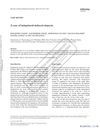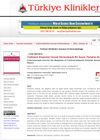
The new gel for hair loss is safe, effective, and reduces side effects.
 6 citations,
July 2013 in “Acta Clinica Belgica”
6 citations,
July 2013 in “Acta Clinica Belgica” The document concludes that combination therapy is most effective for treating excessive hair growth in women with idiopathic hirsutism, and more research is needed to understand the condition.
 3 citations,
July 2011 in “Expert Review of Dermatology”
3 citations,
July 2011 in “Expert Review of Dermatology” Effective treatments for excessive hair growth in women include creams, laser therapy, and medications, with the choice depending on individual needs and potential side effects.
 47 citations,
August 2000 in “Endocrine Reviews”
47 citations,
August 2000 in “Endocrine Reviews” The document concludes that more research is needed to understand excessive hair growth in women with normal hormone levels and regular ovulation.
 37 citations,
March 2014 in “Journal of Trace Elements in Medicine and Biology”
37 citations,
March 2014 in “Journal of Trace Elements in Medicine and Biology” Lower hair zinc and copper levels found in Turkish males with hair loss; higher BMI linked to less hair zinc.
January 2022 in “Journal of Cosmetics, Dermatological Sciences and Applications” The serum increased hair density and was well-tolerated, but didn't affect hair thickness or shedding.
 8 citations,
September 2017 in “Journal of Natural Medicines”
8 citations,
September 2017 in “Journal of Natural Medicines” Applying an extract from Perilla frutescens helps hair grow and fights the effects of hair loss hormones.
 11 citations,
January 2001 in “Cambridge University Press eBooks”
11 citations,
January 2001 in “Cambridge University Press eBooks” Androgens can cause hair growth in some areas but hair loss on the scalp.
 September 2003 in “Current Paediatrics”
September 2003 in “Current Paediatrics” The document concludes that accurate diagnosis and understanding the type of hair disorder are crucial for treating hair loss in children.
 40 citations,
May 2020 in “Cureus”
40 citations,
May 2020 in “Cureus” The conclusion is that treatments for Telogen Effluvium exist, but standard treatment guidelines are needed.
 January 2024 in “Medicine”
January 2024 in “Medicine” Hypothyroidism is often linked to the hair loss condition telogen effluvium.
 55 citations,
November 2018 in “American journal of human genetics”
55 citations,
November 2018 in “American journal of human genetics” Mutations in the LSS gene cause a rare type of hereditary hair loss.
 3 citations,
June 2009 in “The journal of alternative and complementary medicine/Journal of alternative and complementary medicine”
3 citations,
June 2009 in “The journal of alternative and complementary medicine/Journal of alternative and complementary medicine” Green tea extract may help reduce excessive hair growth.
 7 citations,
February 2010 in “Journal of Dermatological Treatment”
7 citations,
February 2010 in “Journal of Dermatological Treatment” Imiquimod cream can rarely cause temporary hair loss.
 11 citations,
February 2019 in “Journal of Cosmetic Dermatology”
11 citations,
February 2019 in “Journal of Cosmetic Dermatology” Low zinc and biotin levels linked to male hair loss; supplements may help.
 10 citations,
August 2012 in “Current Problems in Pediatric and Adolescent Health Care”
10 citations,
August 2012 in “Current Problems in Pediatric and Adolescent Health Care” Hair changes can indicate systemic diseases or medication effects.
 40 citations,
September 2017 in “F1000Research”
40 citations,
September 2017 in “F1000Research” Oral minoxidil effectively reduces hair shedding in women with CTE, with no major side effects.
 July 2015 in “Cambridge University Press eBooks”
July 2015 in “Cambridge University Press eBooks” Androgens like testosterone affect skin health and can lead to conditions such as acne and hair loss, with various treatments available.
 3 citations,
May 2019 in “Journal of Cosmetic Dermatology”
3 citations,
May 2019 in “Journal of Cosmetic Dermatology” Miliacin with polar lipids helps hair growth and improves hair loss in women.
 January 2015 in “Turkiye Klinikleri Journal of Dermatology”
January 2015 in “Turkiye Klinikleri Journal of Dermatology” Peripilar keratin casts are a helpful sign for diagnosing traction alopecia.
 January 2023 in “International journal of sciences”
January 2023 in “International journal of sciences” Platelet-Rich Plasma therapy helped significantly in hair recovery for a hair loss condition after infection.
Combining PRP with a special lotion is more effective for hair loss than PRP alone.
 July 2023 in “Dermatology practical & conceptual”
July 2023 in “Dermatology practical & conceptual” Low hemoglobin levels are significantly correlated with hair loss in women with Telogen Effluvium.
 24 citations,
May 1963 in “Archives of Dermatology”
24 citations,
May 1963 in “Archives of Dermatology” Most new moms had their hair grow back within 4-6 months after childbirth, and hair loss is likely due to hormonal changes.
 75 citations,
May 1986 in “Clinics in endocrinology and metabolism”
75 citations,
May 1986 in “Clinics in endocrinology and metabolism” Male hormones are important for hair and oil gland development and can cause conditions like excessive hair growth and acne.
 October 2023 in “The Cochrane library”
October 2023 in “The Cochrane library” The medicine baricitinib was found to notably improve hair regrowth in alopecia areata, but more research is needed on its side effects and other treatments.
 10 citations,
October 2002 in “Journal of The American Academy of Dermatology”
10 citations,
October 2002 in “Journal of The American Academy of Dermatology” The document concludes that a man's long hair may have helped diagnose his rare case of chronic hair shedding, for which no treatment is advised.
 2 citations,
January 2012 in “Journal of metabolic syndrome”
2 citations,
January 2012 in “Journal of metabolic syndrome” The document concludes that hirsutism can be managed with various treatments tailored to the individual, potentially improving quality of life.
 3 citations,
January 2012 in “Elsevier eBooks”
3 citations,
January 2012 in “Elsevier eBooks” The document says that there are treatments for hair and nail diseases.
4 citations,
November 2017 in “PubMed” Miracle fruit seed oil significantly reduces hair breakage in women with damaged hair.



























